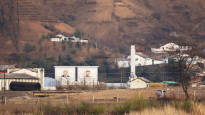In the past, North Korean residents have traded or tried to defect through the slightly more lightly controlled northern border. Now barriers are also being erected on the borders with Russia and China.
North Korea continues to strictly isolate its citizens.
The pandemic stifled travel everywhere. North Korea has declared that it has defeated the virus, but the country’s strict lockdown seems to continue despite the improvement in the situation.
North Korea’s northern border with China and Russia has been a route for smugglers and dissidents to the outside world. South and North Korea are separated by the demilitarized zone on the Korean peninsula, named the most carefully guarded border in the world.
Now the control of the northern border area is also being tightened. The authorities have maintained fences, walls and monitoring stations for more than 400 kilometers along the Chinese border. The entire length of the border is about 1400 kilometers. Russia and North Korea have a common border of 18 kilometers.
The news agency Reuters and the US-based Middlebury Institute have studied North Korea based on satellite images, activists and information obtained from the border region.
Satellite data shows that fences are erected where there are no natural barriers such as mountains.
– The traditional route between North Korea and China is practically closed, says a South Korean pastor who helps defectors Kim news agency Reuters.
North Korea has not spoken publicly about the construction projects in the border areas.
The number of defectors is decreasing
Only 67 defectors came to South Korea in 2022. Before the corona pandemic in 2019, there were more than 1,000 visitors.
Border control also shrinks officially prohibited but practically accepted informal trade, which enables goods to be traded on the North Korean side. Couriers have been women and residents of particularly poor border regions. The loss of trade reduces their livelihoods.
The position of defectors’ relatives who stayed in North Korea is also deteriorating. Requests for money from the north have increased. Currency has also been transported unofficially with couriers.
Couriers stay behind the border
The lives of couriers and smugglers are risky when cross-border trade is no longer viewed through the cracks. Based on the information given by the defectors, it is possible to leave North Korea, but returning with the cargo has become impossible.
On the Chinese side of the border, there are a group of traders who are stuck waiting to return. More troops specialized in monitoring the border area have been sent to the area.
China’s Ministry of Foreign Affairs has not confirmed that the traders will stay on the other side of the border.
In November, the US Treasury Department imposed sanctions on North Korean border officials for human rights violations.
The elite are tied to Kim
the leader of North Korea Kim Jong-un in the early years, foreign trade was gradually liberalized and small entrepreneurs were allowed some business activity. A new industry was born, donju, loosely translated as “masters of money”. Now this business is also being restricted.
At the same time, Kim seems to bind the party elite to his sphere of influence more and more closely. The loyalty of Kim’s inner circle is measured by a mechanism that, in exchange for favors and loyalty, gives military and party members small benefits.
At the same time, the food shortage is getting worse again. According to the UN, almost half of the population was suffering from food shortages even before the pandemic. Soon there may even be an outright famine like the 1990s. The US TV channel CNN writes about it, among others.
The leader of North Korea thus seems to be fighting both external threats and internal attempts to subvert power.
Source: Reuters
